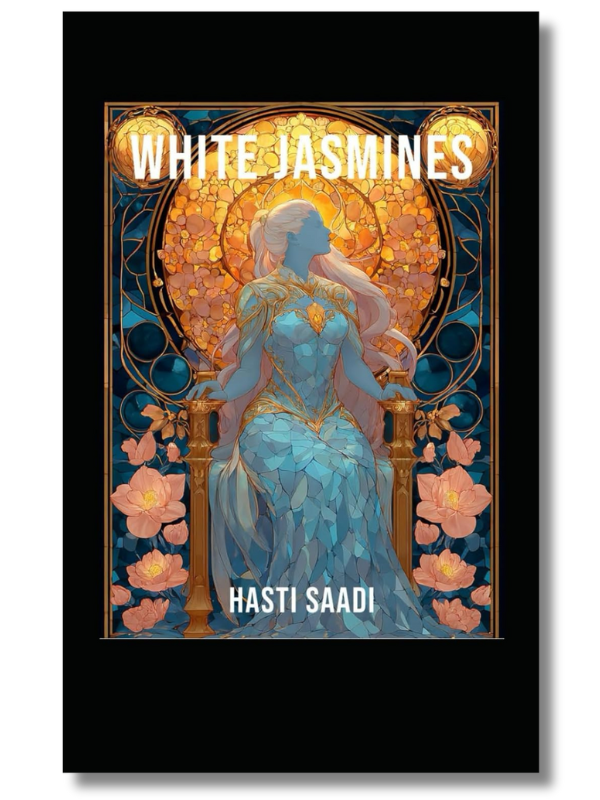White Jasmines
by Hasti Saadi
Genre: Literary Fiction
ISBN: 9798232496562
Print Length: 230 pages
Reviewed by Samantha Hui
A thoughtful meditation on finding peace in the endless cycle of breaking and rebuilding
White Jasmines is a book on the cyclical nature of love, life, and loss, following one woman’s journey through contradictions and confusions of the human desire for connection. It is a philosophical and emotional exploration of what it means to crave connection, to risk vulnerability, and to face the overwhelming freedom of choice.
Hasti Saadi examines how the same freedom that allows us to imagine new possibilities also exposes us to misunderstanding, disappointment, and heartbreak. Yet, in that exposure lies the potential for deep connection and transformation. This novel is an introspective, lyrical work that explores grief, intimacy, and the slow, contemplative process of rediscovering one’s faith in love, in God, and in life itself.
“One struggle of living in this world is dealing with guilt, feeling guilty for sins we haven’t even committed.”
Over the course of forty days, the narrator is guided by a stronger version of herself and the God of the universe. She shares her reflections in prose that feels like a series of journal entries or prayers. Early on, she struggles with isolation, doubt, and a desire to seize control of her destiny. She is haunted by memories of past loves, unspoken longings, and unanswered questions, which she holds up to the light in order to make sense of them.
Through her daily meditations, she begins to witness nature as a guide with sunlight, leaves, birds, and flowers mirroring her internal growth and offering her moments of clarity. Her journey with God and reflections on her past move her from resistance to acceptance, teaching her that peace cannot be forced into existence but must be allowed to take root naturally.
“I created you out of love and for the sake of love! Yet, I never expected that giving you the breath of life would lead to your unraveling.”
Hasti Saadi writes White Jasmines in a style that feels both intimate and timeless, blending the immediacy of a personal journal with the meditative tone of spiritual poetry. The book is written in first person present tense, which allows readers to feel as though they are sitting quietly beside the narrator, witnessing her transformation in real time.
Saadi’s language is lush and evocative, full with the natural imagery of jasmine blossoms, sea waves, birds, and butterflies that mirror the narrator’s inner shifts. The prose often reads like a prayer or meditation, slowing the reader down to savor each line. Saadi’s careful balance of vulnerability and philosophical depth makes the narrative both emotionally accessible and spiritually complex.
“The ardor for living emerges as a significant gift that requires all human emotions for genuine appreciation.”
One potential challenge of White Jasmines is that, while it is technically a fiction, it often reads more like an extended meditation or spiritual diary. This works beautifully for what the book is trying to accomplish, immersing readers in the narrator’s contemplative state of mind. However, it can sometimes hold readers at arm’s length. We are given glimpses into the narrator’s personal life, but they remain abstract rather than fully fleshed-out. There are no long, concrete scenes or detailed portraits of the other people who populate her world; instead, we know her primarily through her internal reflections. For some readers, this intimate, inward-looking exploration of faith and love will be exactly what makes the book so powerful, but others may wish for a narrative that situates her experiences more firmly in the external world.
“I often referred to my monochrome days as the canvas of my life, and painting over them was how I added new landscapes and perspectives.”
White Jasmines offers readers a profound experience of reflection and renewal. It invites us to consider our own cycles of loss and rebirth, our own dance between control and acceptance. By the time readers turn the final page, they are likely to feel both stilled and stirred, encouraged to seek their own path toward peace. I would recommend this book to anyone ready to linger in a text that treats love not as a singular event, but as a lifelong practice of opening, closing, and beginning again. As Saadi writes, “Each day offers an opportunity to reevaluate the lessons I have garnered,” a reminder that, like the narrator, we are always invited to begin again.
Thank you for reading Samantha Hui’s book review of White Jasmines by Hasti Saadi! If you liked what you read, please spend some more time with us at the links below.
The post Book Review: White Jasmines by Hasti Saadi appeared first on Independent Book Review.
